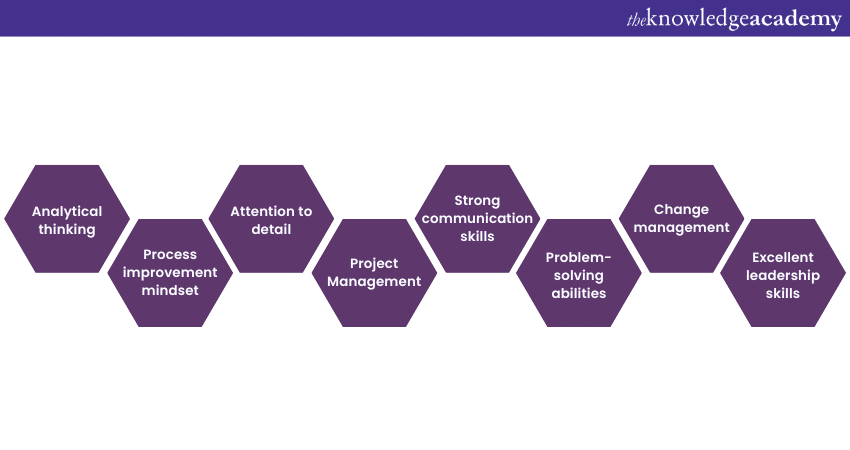We may not have the course you’re looking for. If you enquire or give us a call on +61 1-800-150644 and speak to our training experts, we may still be able to help with your training requirements.
Training Outcomes Within Your Budget!
We ensure quality, budget-alignment, and timely delivery by our expert instructors.

Are you seeking a rewarding career that deals with problem-solving, data analysis, and process improvement? Look no further than the Lean Six Sigma Career Path. Whether you’re newly graduate or an experienced professional seeking a new challenge, understanding the importance of Lean Six Sigma Certification can open doors to a promising future.
Today, organisations worldwide pay high salaries to Lean Six Sigma Professionals thanks to their high demand across industries. According to Glassdoor, the average annual salary of a Lean Six Sigma expert is £47,947.
Considering the field’s high prospects, it is time for you to invest in a Business Improvement career. But how can you do that? How to become a catalyst for change? Worry no more. Read this blog to explore the Lean Six Sigma Career Path. Also, learn about the certification benefits and the exciting opportunities it presents. You will also learn about how to get certified in lean six sigma. Read more to learn more!
Table of Contents
1) What is Lean Six Sigma Certification?
2) What are various Lean Six Sigma Certification levels?
3) Job opportunities after obtaining the LSS Certification
4) Skills required for an LSS career
5) A step-by-step guide to building a career in Lean Six Sigma
6) Conclusion
What is Lean Six Sigma Certification?
Lean Six Sigma Certification is a valuable asset for individuals seeking to establish themselves in process improvement and operational excellence. It provides a structured framework and recognised set of skills that employers value in today’s competitive business landscape.
Obtaining a Lean Six Sigma Certification demonstrates the candidate’s proficiency in applying Six Sigma Lean Process and tools to drive organisational success. Acquiring a Lean Six Sigma Certification underscores the candidate's expertise in deploying Six Sigma methodologies within the Six Sigma Lean process to optimise organisational performance. It also showcases their commitment to quality, efficiency, and continuous improvement. Additionally, the certification enhances their credibility and opens doors to various career opportunities.
Acquiring this certification also involves completing formal training and passing an examination. Today, many reputable organisations offer certification courses that can assist candidates in gaining a strong knowledge of the LSS methodology and pass the certification examination.

What are various Lean Six Sigma Certification levels?
There are various levels or belts of Lean Six Sigma Certification that candidates can obtain. Each certification caters to different skill sets and responsibilities. Here are the commonly recognised as Lean Six Sigma Belts.
a) Yellow Belt: This is an entry-level certification which provides a foundational understanding of Lean Six Sigma, its concepts, tools, and techniques. Lean Six Sigma Yellow Belt holders are team members supporting Green and Black Belt projects. By earning a Lean Six Sigma Yellow Belt, individuals demonstrate their commitment to quality and efficiency within organisational processes. This certification serves as a valuable asset for those seeking to enhance their career prospects and contribute to continuous improvement efforts in their respective roles.
b) Green Belt: The Green Belt Certification equips professionals with the deep knowledge and skills necessary to lead process improvement projects. Lean six sigma Green Belt Professionals work closely with Black Belts and assist in analysing data, identifying improvement opportunities, and implementing solutions.
c) Black Belt: Lean Six Sigma Black Belt Certification is for experienced professionals capable of leading complex improvement initiatives. Black Belts possess advanced analytical skills, Project Management capabilities, and the ability to mentor Green Belts. They also assist in directing organisational change and achieving significant results.
d) Master Black Belt: It is designed for individuals who possess extensive expertise and experience in leading large-scale improvement initiatives. Master Black Belts provide guidance, mentorship, and training to Green and Black Belts, ensuring the implementation of Lean Six Sigma principles successfully across the organisation.
Become a certified expert in process improvement and data-driven decision-making with our Lean Six Sigma Green Belt course now!
Job opportunities after obtaining the LSS Certification
A Lean Six Sigma Certification can open a wide array of career opportunities across various industries. Today, organisations in both the private and public sectors recognise the value of Lean Six Sigma professionals in driving process improvement and operational excellence. Here are some common career opportunities in the field of LSS:
a) Process Improvement Specialist: Responsible for identifying inefficiencies, analysing data, and implementing process improvements.
b) Quality Manager: Oversees quality assurance processes, manages compliance, and ensures adherence to Lean Six Sigma principles.
c) Operations Analyst: Analyses operational data, identifies bottlenecks, and proposes solutions for increased efficiency.
d) Supply Chain Manager: Optimises supply chain processes, reduces lead times, and improves overall performance.
e) Project Manager: Leads Lean Six Sigma projects, ensures team coordination and successful execution.
f) Consultant: Provides expert guidance and support to organisations seeking to implement Lean Six Sigma principles.
Skills required for an LSS career
Acquiring certain key skills is essential to excel in a Lean Six Sigma career. Individuals can thrive in Lean Six Sigma careers and drive impactful process improvements by developing and honing these skills. These skills include the following:

a) Analytical thinking: LSS professionals must be able to make data-driven decisions, identify patterns, and solve complex problems using Lean Six Sigma methodology.
b) Process improvement mindset: A Lean Six Sigma career requires a mindset focused on continuous improvement to identify inefficiencies, streamline processes, and eliminate waste.
c) Attention to detail: Keeping an eye on details is vital in Lean Six Sigma, as it involves working with precise measurements, statistical analysis, and data interpretation.
d) Project Management: Effective Project Management skills, including planning, organising, and resource allocation, are essential to drive successful project outcomes.
e) Strong communication skills: Clear and concise communication is vital when collaborating with cross-functional teams, stakeholders and presenting findings to management.
f) Problem-solving abilities: Lean Six Sigma Professionals need strong problem-solving skills to identify root causes, develop solutions, and implement changes.
g) Change management: Implementing process improvements often requires managing change within an organisation. Having change management skills enables professionals to navigate resistance, engage stakeholders, and ensure the successful adoption of new processes.
h) Excellent leadership skills: Leadership qualities are valuable in Lean Six Sigma careers, particularly in roles that involve leading improvement projects or teams.
Unlock the power of Lean Six Sigma with our Lean Six Sigma Yellow Belt course.
A step-by-step guide to building a career in Lean Six Sigma
The Lean Six Sigma Career Path offers exciting possibilities for professional growth and the chance to make a lasting impact on employers. But at the same time, acquiring knowledge of building a promising career in the field is also crucial. Here’s how you can do that:
a) Gain knowledge: Start by thoroughly understanding Lean Six Sigma methodologies, tools, and principles. Take training courses, read relevant books, and explore online resources to expand your knowledge base.
b) Obtain a certification: Pursue a Lean Six Sigma certification course at the appropriate level (Yellow, Green, Black, or Master Black Belt) to validate your skills and enhance your credibility in the field.
c) Apply skills: Seek opportunities to apply Lean Six Sigma concepts in real-world scenarios. Look for projects within your organisation to contribute to process improvement initiatives.
d) Expand network: Engage with other professionals in the community. Attend industry conferences, join professional associations, and participate in online forums to connect with like-minded individuals.
e) Build a strong resume: Build an influential resume to showcase your Lean Six Sigma skills, knowledge and achievements. Quantify the benefits in terms of cost savings, quality enhancements, or efficiency gains to demonstrate your value.
f) Continuously learn and improve: Stay updated with the latest developments in LSS by attending advanced training sessions, pursuing higher-level certifications, and engaging in continuous learning.
Conclusion
The Lean Six Sigma Career Path presents a wealth of opportunities for individuals aspiring to make a difference in their organisations. By acquiring the necessary skills, obtaining certifications, and continuously developing expertise, professionals can excel in process improvement, quality management, and project leadership roles.
Become a distinguished leader in achieving operational excellence. Register for our Lean Six Sigma Master Black Belt (MBB) course now!
Frequently Asked Questions
Upcoming Business Improvement Resources Batches & Dates
Date
 Lean Six Sigma Green Belt
Lean Six Sigma Green Belt
Mon 13th Jan 2025
Mon 3rd Feb 2025
Mon 24th Mar 2025
Mon 26th May 2025
Mon 21st Jul 2025
Mon 15th Sep 2025
Mon 24th Nov 2025







 Top Rated Course
Top Rated Course


 If you wish to make any changes to your course, please
If you wish to make any changes to your course, please


